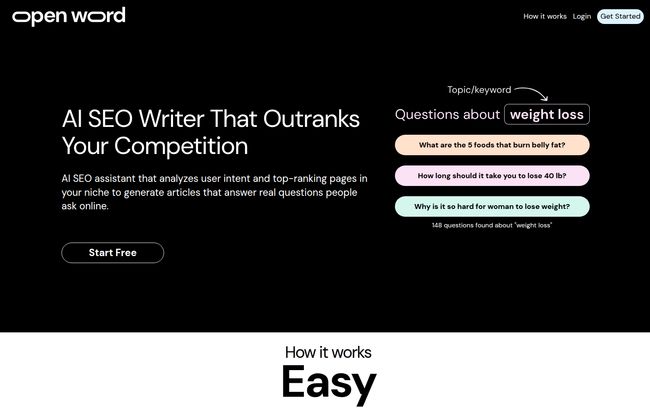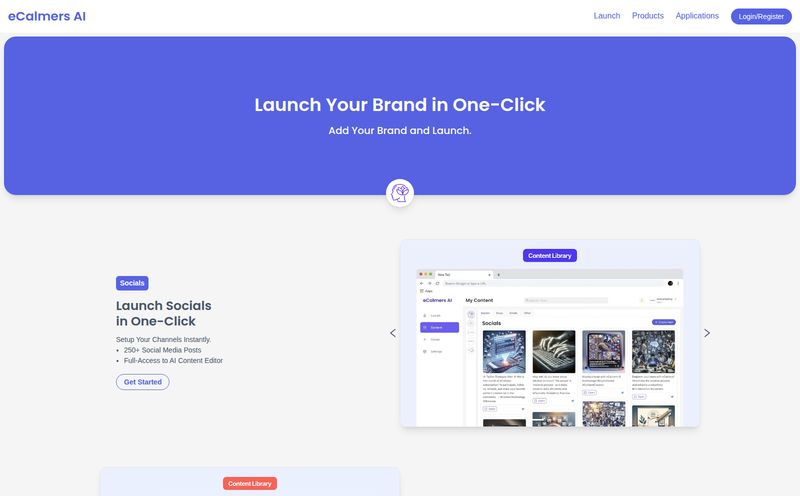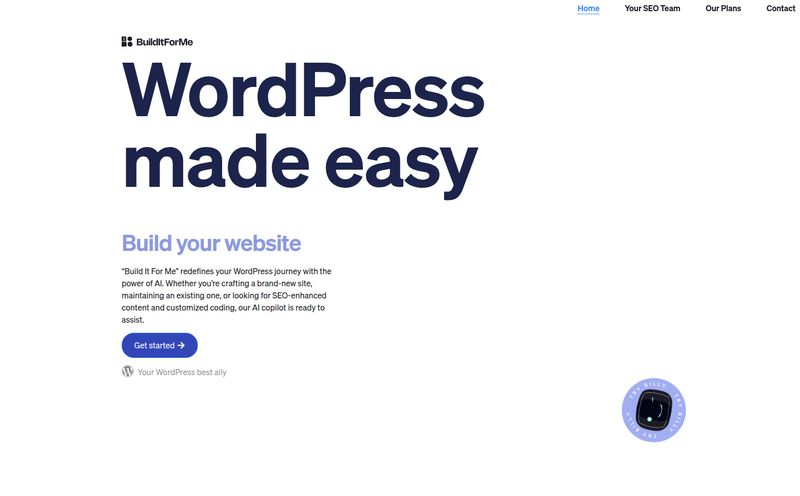If you're in the SEO or content game, you know the grind. The endless cycle of keyword research, content briefs, outlining, writing, editing... it’s a hamster wheel that seems to spin faster every year. We're all chasing that coveted spot on page one of Google, and sometimes it feels like we're just throwing content at a wall to see what sticks.
I've tested more AI writing tools than I can count on both hands. Some are glorified sentence spinners, others are genuinely impressive but lack a certain... strategic soul. They can write, sure, but can they think like an SEO? Can they understand the why behind a search query? That's always been the missing piece for me.
Then I stumbled upon OpenWord. Their headline, "AI SEO Writer That Outranks Your Competition," is bold. I’m naturally skeptical of claims like that. But what really caught my eye was the how: "By...generat[ing] articles that answer real questions people are asking."
Now that's interesting. It’s a subtle shift in focus from just targeting a keyword to targeting the curiosity behind it. And in my experience, that's where the SEO magic has been heading for years. So, I decided to take it for a spin.
So, What is OpenWord, Really?
On the surface, OpenWord is an AI-powered tool for generating long-form, SEO-optimized content. But that's a description that fits dozens of tools. The core difference here is its starting point. Instead of just taking your keyword and running with it, OpenWord’s entire process is built around discovering the questions your audience is typing into Google.
Think of it less as a content vending machine and more like a research assistant who’s been eavesdropping on your target audience’s most pressing concerns. It's designed to help you become the go-to expert in your niche not by guessing what people want to know, but by using data to find out for certain. It's a simple premise, but a powerful one.

Visit OpenWord
Getting Started: Is It Really That Easy?
The website promises a simple process, and honestly, it delivers. It’s refreshingly straightforward.
- You feed it a topic or keyword. I started with something broad like "content marketing for small business."
- It scours the web for questions. This is the cool part. It pulls a list of actual questions people are asking related to that topic. Things like, "How can a small business start content marketing with no budget?" or "What are the best content marketing examples for local businesses?" This is gold, stuff I'd normally spend an hour digging through 'People Also Ask' boxes and forums to find.
- You pick the questions, it writes the article. You select the questions you want your article to answer, and with a click, OpenWord generates a full-length blog post structured around those queries.
The resulting article is a solid first draft, complete with headings and paragraphs aimed at directly addressing the chosen questions. It's a massive head start.
The Features That Actually Move the Needle
A lot of tools boast about features, but which ones actually save you time and get results? Here’s my breakdown of what stands out in OpenWord.
Beyond Keywords: The Focus on User Intent
We've all been told a million times that user intent is king. But figuring it out can feel like guesswork. OpenWord’s question-based approach is basically a cheat code for user intent. When you answer a direct question, you are perfectly matching the intent of the person who asked it. It sidesteps the whole song and dance of trying to interpret what a searcher really wants from a two-word keyword. I’ve always felt that the future of SEO is in becoming an answer engine for your niche, and this tool is built entirely on that philosophy.
Automated Competitor and SERP Analysis
This is happening under the hood, but it's probably the most powerful part of the platform. When OpenWord generates content, it claims to be analyzing the top-ranking pages for your topic. In essence, it’s looking at what Google already loves and is trying to create something that incorporates those successful elements. It's like having a junior SEO analyst who does a quick competitive review before the writer ever types a word. It’s not going to replace a deep-dive from a tool like Ahrefs, but for generating content at scale, it's a huge advantage.
From Questions to Long-Form Content in a Click
Writer's block is real. So is 'outlining fatigue'. For me, the hardest part of writing an article is often creating the structure. OpenWord's ability to take a handful of questions and instantly scaffold them into a coherent, long-form article is a massive time-saver. It turns the daunting task of 'writing a 1500-word blog post' into the much more manageable task of 'editing and personalizing this solid 1200-word draft.'
My Honest Take: The Good and The Not-So-Good
No tool is perfect. Let's get into the nitty-gritty. Here's a quick look at what I loved and what you should be aware of.
| The Upside | The Caveats |
|---|---|
| Speed and Efficiency. The sheer speed at which you can go from an idea to a full draft is incredible. It genuinely cuts down content creation time. | Needs a Human Touch. This is not a 'copy, paste, publish' machine. You still need to edit, fact-check, and inject your own voice and stories. Relying on it 100% will make your content sound... well, robotic. |
| Fantastic for Topic Ideation. The question discovery feature is, frankly, worth the price of admission alone. It's a brilliant way to build a content calendar that you know your audience cares about. | Risk of Generic Content. If you're lazy and just accept the first output, your article might sound similar to another one generated for someone else. Personalization is non-negotiable. |
| Builds Authority. By consistently answering questions, you are positioning your brand as a helpful expert. It's a direct path to building topical authority, which Google loves. | Cost Factor. While I couldn't find a clear pricing page, AI tools come with a cost. You have to weigh the investment against the time you save. |
What's the Deal with OpenWord's Pricing?
Here's a moment of real-world reviewing for you. The features list on the homepage mentions a "Start free, pay as go" model, which sounds great for freelancers or businesses who want to test the waters without a hefty monthly commitment. However, when I tried to find a dedicated pricing page... I hit a 404 error. Oops! It happens.
My guess is they're either updating it or it's a temporary glitch (the 404 page mentioned it was built on Bubble, a popular no-code platform, so small bugs can happen). For now, the best bet is to sign up for the free start and see what the 'pay as you go' structure looks like from inside the platform.
Who Should Use OpenWord? (And Who Can Skip It?)
I think OpenWord is a fantastic fit for a few specific groups:
- Solo Bloggers and Content Creators: If you're a one-person show, this tool can feel like having a research assistant and a junior writer on your team, drastically increasing your output.
- Small Businesses: For companies that need to create helpful blog content to attract clients but don't have a dedicated marketing team, this is a perfect way to get started and build momentum.
- SEO Agencies: It’s a great tool for scaling content production for clients, especially for creating first drafts that your team can then refine and perfect.
Who should probably pass? Large enterprises with established, multi-person writing teams and strict brand voice guidelines might find it a bit restrictive. Also, if you’re a creative writer who treasures the art of crafting every single sentence from scratch, you'll find the AI approach less satisfying.
Final Verdict: Is OpenWord a Game Changer?
Look, no AI tool is a silver bullet that will magically solve all your SEO woes. But OpenWord is one of the smartest I’ve seen. It’s built on a sound, modern SEO strategy: answer the user's questions better than anyone else.
It’s not about replacing writers; it's about augmenting them. It automates the most tedious parts of the process—the research and the initial drafting—so you can focus on the high-value tasks: adding personality, sharing unique insights, and building a genuine connection with your audience. For me, that’s a win. It’s a powerful ally in the fight for visibility, and one I’ll be keeping in my toolkit.
Frequently Asked Questions About OpenWord
- How does OpenWord make sure the content is SEO-friendly?
- It focuses on two main things: answering specific user questions (which is great for matching search intent) and analyzing the current top-ranking pages (SERPs) to see what structures and topics Google is already rewarding for that query.
- Is there a free trial available?
- Yes, according to their website, you can "Start Free" and then it operates on a "Pay as you go" model. This lets you try it out without an immediate subscription.
- Can I export the content and the questions?
- Yes, the platform explicitly lists "Export & save questions" as a feature, which is great for building out your own content strategy documents or using the questions as ideas for other formats like video or social media.
- Is the AI content ready to publish immediately?
- I would strongly advise against it. The content is a fantastic first draft, but it always benefits from human editing. You should review it for accuracy, tone of voice, and add your own personal anecdotes or examples to make it truly unique.
- Does it work for very niche industries?
- In my testing, it works best when there's some existing search data for it to analyze. For extremely obscure niches with very low search volume, it might struggle to find enough questions to work with. But for most standard B2B and B2C industries, it should perform well.



